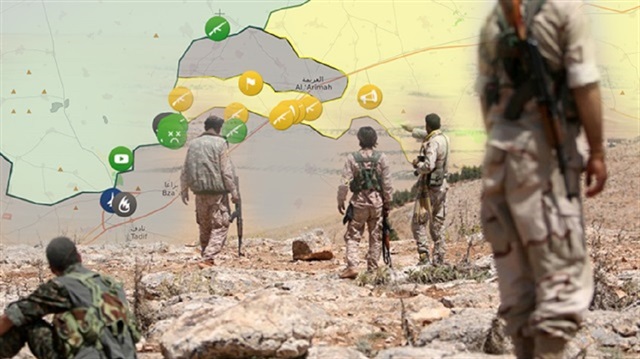
Despite claims from the Pentagon and White House that YPG is leaving Manbij, the terror group is colonizing in the city attempting to capture more land in western outskirts
The outlawed Kurdistan Workers' Party (PKK) terrorist group's Syrian branch, the People's Protection Unit (YPG), is playing a dangerous trick in the northern Syrian city of Manbij, located on the western banks of the Euphrates River.
Despite Turkey's repeated warning and three statements from the U.S. authority on their withdrawal from the city and return to the east of the Euphrates River, the terror group is settling in new families to change the demographic structure of the city.
On Wednesday, U.S. President Obama's special envoy on the fight against Daesh, McGurk, officially announced that YPG would withdraw from Manbij.
But he added that the withdrawal will happen after the terror group completes training 'local forces'.
Sources from the ground told Yeni Şafak that YPG is settling in the city as many lands were registered on their name in order to appear as being “local".
Moreover, the terror group has shifted 230 Kurdish families from Qamishli and settled them in three main neighborhoods, Hadavan, Jazzera, and the East Neighborhood, in the city over the past four months.
At the same time, they displaced thousands of local Arab families by forcing them out of their houses and lands in Manbij.
The newly-settled family members and newly registered land owners are being shown as the “local force", which will take control of the city after the so-called withdrawal trick.
By this game, YPG try to make an “eyewash" that they are withdrawing and handing over the control of the city to local forces, but in reality the local forces are part of YPG.
Conflicting statements from the US officials
Hours after the statement from the Obama envoys, the Pentagon issued another statement conflicting with YPG's attitude in Manbij.
Anti-Daesh coalition spokesman, Col. John Dorrian, caused additional confusion by saying YPG elements have just started to move out of the town, while speaking to Pentagon reporters via videoconference from Baghdad.
Tension between Turkey and the U.S. has persisted for months regarding the time when all elements affiliated with the PKK terror group would leave Manbij and cross back to the eastern banks after they helped local Arab forces liberate the town from Daesh.
The Pentagon had previously said the fighters left the city.
“My understanding is they were departing and they were doing that today. But as far as whether every single one of them is gone, I would be very uncomfortable saying every single one," Dorrian said to reconcile what he said with McGurk's tweet.
Dorrian insisted the Pentagon has said from the beginning that YPG leadership elements would withdraw from Manbij, but leave trainers to groom local fighters.
It appears, however, that it was the first time the U.S. military disclosed that YPG elements would train local forces in Manbij.
Dorrian also commented on the Turkish-backed Free Syrian Army's movement toward the Daesh stronghold in the northwestern Syrian town of al-Bab.
He said it would only take a short time for those Syrian opposition forces to take over the town from Daesh.
“They've not yet moved into al-Bab and taken the city, but they are very, very close, encountering some very pretty tough resistance. They do expect to be able to power through that," he said.
According to Dorrian, the coalition has not been a part of the Turkish advance toward al-Bab and has not given air support to Turkish-backed forces.
YPG seizes 7 more villages west of Manbij
Despite statements from the Pentagon and White House claiming the terrorists are leaving Manbij, the YPG elements launched a fresh attack in the western outskirts of the city and occupied seven villages on the Manbij – al Bab line.
Shi'ite militia takes Tal Afar Airport from Daesh
On the other hand, in the context of the Mosul operation, Iraq's Hashd al-Shaabi, a Shi'ite militia, has confirmed late Wednesday that it has seized Tal Afar Airport from Daesh.
The announcement came from the press office of Hashd al-Shaabi, an umbrella group of pro-government Shi'ite militias established in mid-2014 specifically to fight Daesh.
On Monday, the Shi'ite militia, in coordination with the Iraqi army's Joint Operations Command, launched the third phase of an ongoing operation to retake areas east of Tal Afar city (some 65 kilometers (40 miles) west of Mosul) from the Daesh terrorist group.
Tal Afar is a Turkmen-majority city in Iraq's northern Nineveh province, of which Mosul is the provincial capital.
Turkish authorities have repeatedly warned of the risk of sectarian conflict if Shi'ite militiamen are allowed to enter Sunni-majority Mosul.
In other parts of Iraq recently taken from Daesh by the Hashd al-Shaabi, including both Fallujah and Ramadi, there have been allegations of Shi'ite fighters mistreating local Sunni residents.





